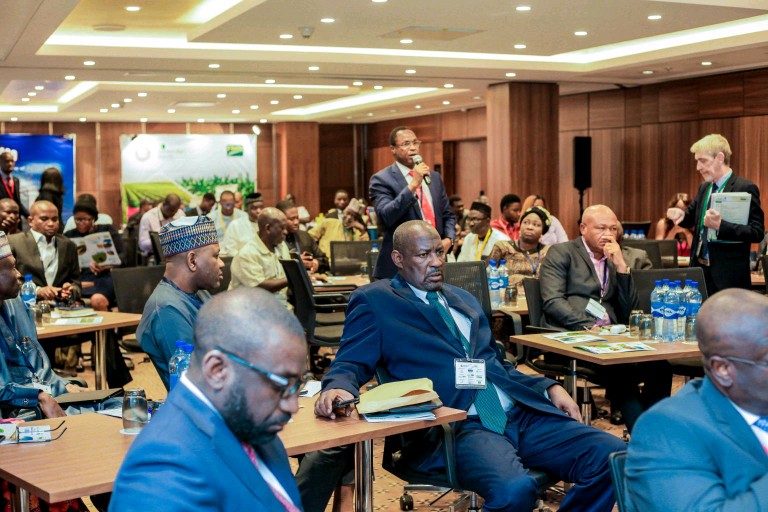Sustaining the paradigm shift
Agriculture is key to long-term economic growth and food security.
Increasingly, rural economic growth plays a critical role in Nigerias successful job creation, economic diversity, improved security and sustainable economic growth. Thus focusing policy instruments and private sector investments will ensure that the commercialization of agriculture includes technologies, financial services, inputs supply chains, and market linkages that directly engage youth and rural poor farmers In line with the vision to harness the golden opportunities that agribusiness presents.
African Farming hosted the second edition of the Agribusiness Summit at Transcorp Hilton, Abuja from 27th to 28th August 2019. This was aimed at creating a cohesive platform for trade and investment opportunities. The summit attracted top government officials, policymakers, importers, distributors, food companies, processors, agribusiness owners, major investors, farmer associations and youth networks.
The keynote speaker was Mr Devakumar V.G Edwin, Group Executive Director- Strategy, Capital Project and Portfolio Development, Dangote Industries Ltd who spoke on the topic Overview on agriculture in Nigeria. This address placed emphasis on the agribusiness climate, agricultural development as well as policy regulations and laws. According to him, agriculture employs 37 percent of the population. He added that this is against the backdrop of the 23 percent unemployment rate in the country. He called for an increase in private sector investments to drive the industry.
Prof. Ibrahim Umar Abubakar, Executive Director of the Institute of Agricultural Research Zaria made a presentation on Nigerias journey to becoming the largest producer of rice in Africa; and the importance of implementing better crop management through improving the marketability of crops as well as creating awareness about soil management.
A clear understanding about the National Agricultural Seeds Act was made by Dr Phillip Ojo, Director General of the National Agricultural Seeds Council (NASC), through a focus on opportunities in the seed sector, innovations in certified seeds and the benefits of seed banks. This was followed by a panel discussion on how modern machinery, irrigation solutions and innovative technologies play a major role in increasing agricultural productivity.
While discussing the impact of pesticides, Dr. Ibrahim Abbas Sodangi of the Kaduna State University gave elaborate presentations about the benefits, effects and challenges of using bio-pesticides. He also spoke on their impact on crops, soil and business.
Another panel session on innovative storage facilities, post-harvest handling, providing linkages between farm and markets featured Dr. Augustine Okoruwa, President Organization for Technology Advancement of Cold Chain in West Africa (OTACCWA); Prof. Lateef Oladimeji Sanni, International Society for Tropical Root Crops (ISTRC) and Deputy Vice-Chancellor (Development)Federal University of Agriculture Abeokuta.
The General Manager of Flour Mills Nigeria, Olusegun Falade gave an insightful presentation on innovative technologies and fintech solutions for handling post-harvest issues. He proposed the usage of tracking devices, improved harvesting implements, fruit packing crates, cold rooms and storage bags that are insect-proof to reduce the impact of food losses.
There was a presentation on livestock farming, a business analysis of the animal husbandry sector and also exploring the methods of maximizing poultry and livestock production outputs.
 The presentation by Al-Mujtaba Abubakar, the First Deputy President, Abuja Chamber of Commerce delved deeper into leveraging agribusiness for rural and community development by generating employment opportunities and empowering the youth. A representative of the Nigerian Investments Promotion Commission (NIPC), Mr. Byron Isi, provided insights into various approaches to value addition in agribusiness and highlighting the challenges and benefits to drive investor confidence.
The presentation by Al-Mujtaba Abubakar, the First Deputy President, Abuja Chamber of Commerce delved deeper into leveraging agribusiness for rural and community development by generating employment opportunities and empowering the youth. A representative of the Nigerian Investments Promotion Commission (NIPC), Mr. Byron Isi, provided insights into various approaches to value addition in agribusiness and highlighting the challenges and benefits to drive investor confidence.
This was followed by a panel discussion on the innovative assessment of the agricultural markets and value chains prior to investment. The panellists discussed inclusive financing models and current customer preferences as drivers of value addition. The panel participants included Eric Nyikwagh, Country representative of YPARD Nigeria; Taiwo Oyaniran, Price Waterhouse Coopers; Ogbonnaya Edu, founder of Farm Awareness for Food Preservation Initiative; Prof. Job Nmadu, President Nigerian Association of Agricultural Economics (NAAE) and Benneth Ejindu of ANAMMCO. Eric advocated for a private sector-driven approach to extension delivery, the establishment of youth mentorship programs and re-training of subject matter specialists on innovative extension methods.
Agriculture is now a profitable business but requires patience, technical expertise and knowledge to understand market dynamics. The key to the economic development of Nigeria rests on the shoulders of the youth., However, they have limited access to credit and many other productive resources necessary for agribusiness investments. The youth are the succeeding farming generation and therefore represent the future of food secured Nigeria. The ageing smallholder farmers are less likely to adopt the new technologies needed to sustainably increase agricultural productivity. There is, therefore, a pressing need to engage the youth in ways that they can see a promising future in agriculture. It also is important to encourage them to pursue careers in agro-based industries.
Photo credit: African Farming
Related Posts
Comments
By accepting you will be accessing a service provided by a third-party external to https://archive.ypard.net/

